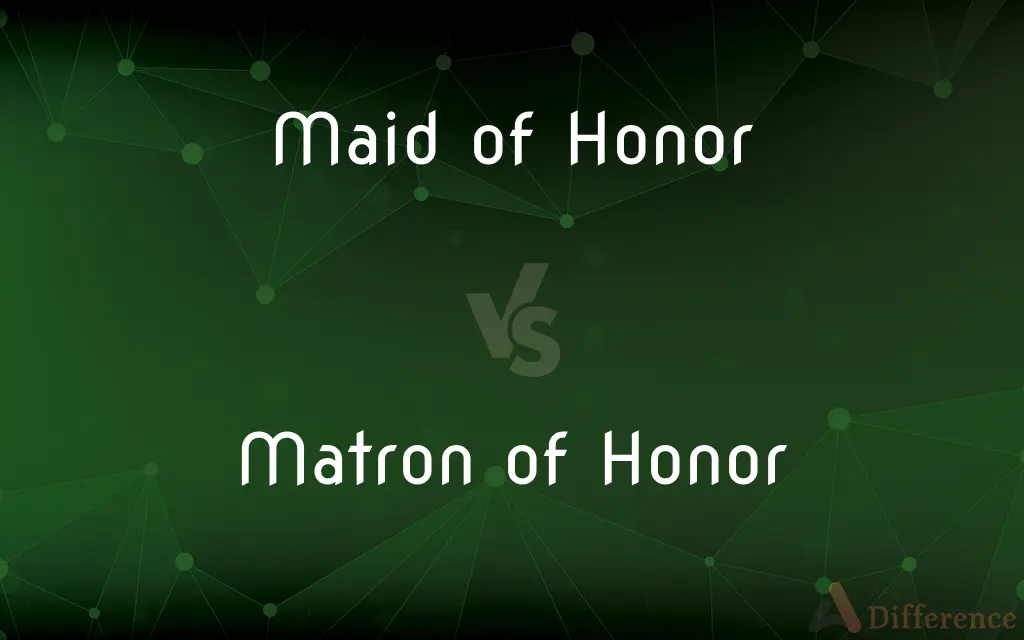Maid of Honor vs. Matron of Honor — What's the Difference?
Edited by Tayyaba Rehman — By Fiza Rafique — Published on December 25, 2023
The Maid of Honor is an unmarried woman in a bridal party, while the Matron of Honor is a married woman in the same role.

Difference Between Maid of Honor and Matron of Honor
Table of Contents
ADVERTISEMENT
Key Differences
At a wedding, roles are designated to honor close friends and family. The Maid of Honor is typically a close friend or sister of the bride who is not married. Conversely, the Matron of Honor holds a similar role but is a married woman.
Both the Maid of Honor and Matron of Honor play crucial roles in wedding preparations and during the wedding ceremony. While the title Maid of Honor suggests youth and singlehood, the Matron of Honor carries a sense of experience, often due to her marital status.
Traditionally, brides would choose either a Maid of Honor or a Matron of Honor. However, in contemporary weddings, it's not uncommon for a bride to have both. The Maid of Honor might be a younger, unmarried sister, while a married older sister might serve as the Matron of Honor.
The duties of both the Maid of Honor and Matron of Honor are generally the same, which include organizing bridal showers, assisting the bride in dress selection, and more. The distinction between a Maid of Honor and a Matron of Honor solely rests on the marital status of the chosen individual.
In essence, the titles Maid of Honor and Matron of Honor are reflections of cultural and social nuances related to marriage. Both are vital members of the bridal party, offering support to the bride throughout the wedding process.
ADVERTISEMENT
Comparison Chart
Marital Status
Unmarried
Married
Role at Wedding
Chief bridesmaid if unmarried
Chief bridesmaid if married
Age Connotation
Often implies younger or same age as the bride
May imply someone older or with marital experience
Common Duties
Bridal shower, assisting bride, ceremonial roles
Bridal shower, assisting bride, ceremonial roles
Presence in Wedding
Traditional choice for an unmarried bridesmaid
Traditional choice for a married bridesmaid
Compare with Definitions
Maid of Honor
The leading figure among bridesmaids, unmarried.
The Maid of Honor delivered a touching speech at the reception.
Matron of Honor
A married chief bridesmaid in a wedding.
Since Laura was already married, she took on the role of Matron of Honor.
Maid of Honor
A primary female attendant to the bride.
The Maid of Honor held the bride's train as she walked down the aisle.
Matron of Honor
A primary female attendant to the bride, post-marriage.
The Matron of Honor shared valuable marital advice with the bride.
Maid of Honor
An unmarried chief bridesmaid in a wedding.
Sarah, being the bride's younger sister, was chosen as the Maid of Honor.
Matron of Honor
A close friend or sister of the bride, currently married.
Being the bride's only married sibling, Catherine was the Matron of Honor.
Maid of Honor
A close friend or sister of the bride, not yet married.
Emily, the bride's best friend since childhood, was the obvious choice for Maid of Honor.
Matron of Honor
A title reflecting marital experience in the bridal party.
The bride's best friend, now married, joyfully accepted the role of Matron of Honor.
Maid of Honor
A title reflecting singlehood in the bridal party.
As the only single sister, Jenna was asked to be the Maid of Honor.
Matron of Honor
The leading figure among bridesmaids, with marital status.
The Matron of Honor, with years of marital experience, shared a heartfelt toast.
Common Curiosities
Is age a factor in choosing between a Maid of Honor and a Matron of Honor?
Not necessarily, but the Matron of Honor might often be older due to being married.
Can a bride have both a Maid of Honor and a Matron of Honor?
Yes, some brides choose to have both, especially if they have close friends or sisters with different marital statuses.
Do their duties differ at the wedding?
No, both roles have similar duties; the distinction is in marital status.
Is the Matron of Honor's speech different from the Maid of Honor's?
The content might differ due to marital experiences, but the essence of celebrating the bride remains the same.
How does the Matron of Honor support the bride?
Similarly to the Maid of Honor, the Matron assists with preparations, offers support, and often shares marital advice.
Is the dress for the Maid of Honor different from other bridesmaids?
Sometimes, to distinguish her role, but it's up to the bride's preference.
Who stands closest to the bride during the ceremony?
Typically, the Maid or Matron of Honor stands closest to the bride.
Does the Maid of Honor always give a speech?
Often, but it depends on the wedding's traditions and the bride's preferences.
What distinguishes a Maid of Honor from a Matron of Honor?
The Maid of Honor is unmarried, while the Matron of Honor is married.
Can a divorced woman be a Matron of Honor?
The title is traditionally tied to current marital status, so she would typically be a Maid of Honor, but traditions can vary.
Can a bride have multiple Maids or Matrons of Honor?
While uncommon, a bride can have multiple if she wishes.
Does the Matron of Honor wear a different dress than the Maid of Honor?
They might wear similar dresses, or they might be differentiated, depending on the bride's choice.
How does the Maid of Honor support the bride?
The Maid of Honor assists with wedding preparations, organizes the bridal shower, and supports the bride emotionally.
Is it essential for the Maid/Matron of Honor to be a relative?
No, the role can be given to any close friend or relative as per the bride's choice.
Can a man take on a similar role to the Maid/Matron of Honor?
Yes, in modern weddings, a "Man of Honor" can take on this role for the bride.
Share Your Discovery

Previous Comparison
Research Hypothesis vs. Research Question
Next Comparison
Intermolecular Forces vs. Intramolecular ForcesAuthor Spotlight
Written by
Fiza RafiqueFiza Rafique is a skilled content writer at AskDifference.com, where she meticulously refines and enhances written pieces. Drawing from her vast editorial expertise, Fiza ensures clarity, accuracy, and precision in every article. Passionate about language, she continually seeks to elevate the quality of content for readers worldwide.
Edited by
Tayyaba RehmanTayyaba Rehman is a distinguished writer, currently serving as a primary contributor to askdifference.com. As a researcher in semantics and etymology, Tayyaba's passion for the complexity of languages and their distinctions has found a perfect home on the platform. Tayyaba delves into the intricacies of language, distinguishing between commonly confused words and phrases, thereby providing clarity for readers worldwide.














































